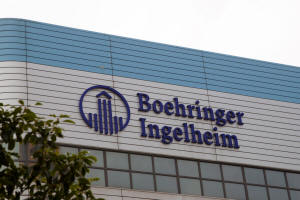Zealand, Boehringer tout higher weight-loss drug efficacy in update
 Send a link to a friend
Send a link to a friend
 [June 24, 2023]
By Ludwig Burger [June 24, 2023]
By Ludwig Burger
FRANKFURT (Reuters) - Zealand Pharma and Boehringer Ingelheim said their
experimental obesity treatment was shown to reduce body weight by close
to 19% in a mid-stage trial when looking at participants who had reached
the intended dosage level.
The detailed results from a mid-stage trial, presented at a meeting of
the American Diabetes Association (ADA) in San Diego on Friday, showed a
higher efficacy than the 14.9% weight reduction reported by the
companies last month in a brief preview of the data.
The treatment regimen starts at a low dosage which is stepped up to
reach a maintenance level - the same as with weekly weight-loss shot
Wegovy by Novo Nordisk and Eli Lilly's Mounjaro, which is expected to
win approval for obesity.
The higher efficacy readout on the new drug came from looking at only
those trial participants that reached the maximum dosage and from
excluding patients who could not keep up with the ramp-up schedule,
mainly because of gastrointestinal side effects.
But Germany's family-owned Boehringer and Denmark's Zealand will likely
take well over a year to run a pivotal phase III trial on their drug,
called BI 456906, and then to argue what they hope will be a better case
with regulators.
For one, they aim to better control side effects, which prompted 24.6%
of patients to stop taking the drug in the Phase II trial. They plan to
give participants more time to ramp up the dosage in the upcoming larger
trial.
"The steeper the dose escalation, the more gastrointestinal side effects
come up," Paola Casarosa, head of therapeutic areas at Boehringer
Ingelheim, told Reuters.

The partners are also eyeing better efficacy by running the planned
Phase III trial for longer because weight loss was not yet levelling off
at the Phase II study's 46 week cut-off time.
[to top of second column]
|

The logo of German pharmaceutical
company Boehringer Ingelheim is seen at its building in Shanghai,
China February 1, 2019. Picture taken February 1, 2019.
REUTERS/Stringer/File Photo
 "Additional weight loss could be
achieved with longer treatment duration," the companies said in a
statement.
As the dose-finding trial was in the second phase of three required
for approval, it was relatively small with close to 400
participants.
The readout was based on a group of 77 people who were meant to ramp
up to the highest of four experimental drug dosages and 54 of those
actually reached that dose.
The design of the Phase III trial is being discussed with
regulators, said Boehringer's Casarosa. She would not be drawn on
when to expect results.
Rivals already have longer-term data. Eli Lilly said last year that
Mounjaro was shown to reduce up to 22.5% in weight after 72 weeks of
treatment in a much larger late-stage trial.
Before that, a late-stage trial showed Wegovy helped patients lose
about 15%-17% of weight over 68 weeks, depending on patient
subgroups in the study.
The enormous demand for weight-loss treatments could support an
obesity market worth up to $100 billion within a decade, industry
executives and analysts have said.
To entrench its lead in obesity, Novo Nordisk is developing two-drug
treatment CagriSema, which was shown last year to reduce body weight
by 15.6% after 32 weeks in a Phase II trial on overweight diabetics.
(Reporting by Ludwig Burger; Editing by Kirsten Donovan)
[© 2023 Thomson Reuters. All rights
reserved.]This material may not be published,
broadcast, rewritten or redistributed.
Thompson Reuters is solely responsible for this content. |